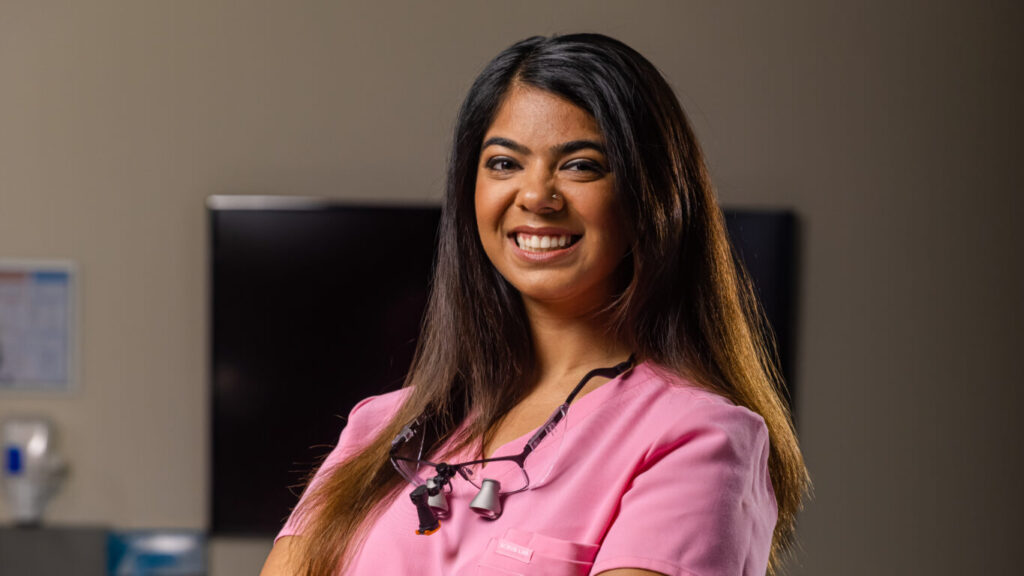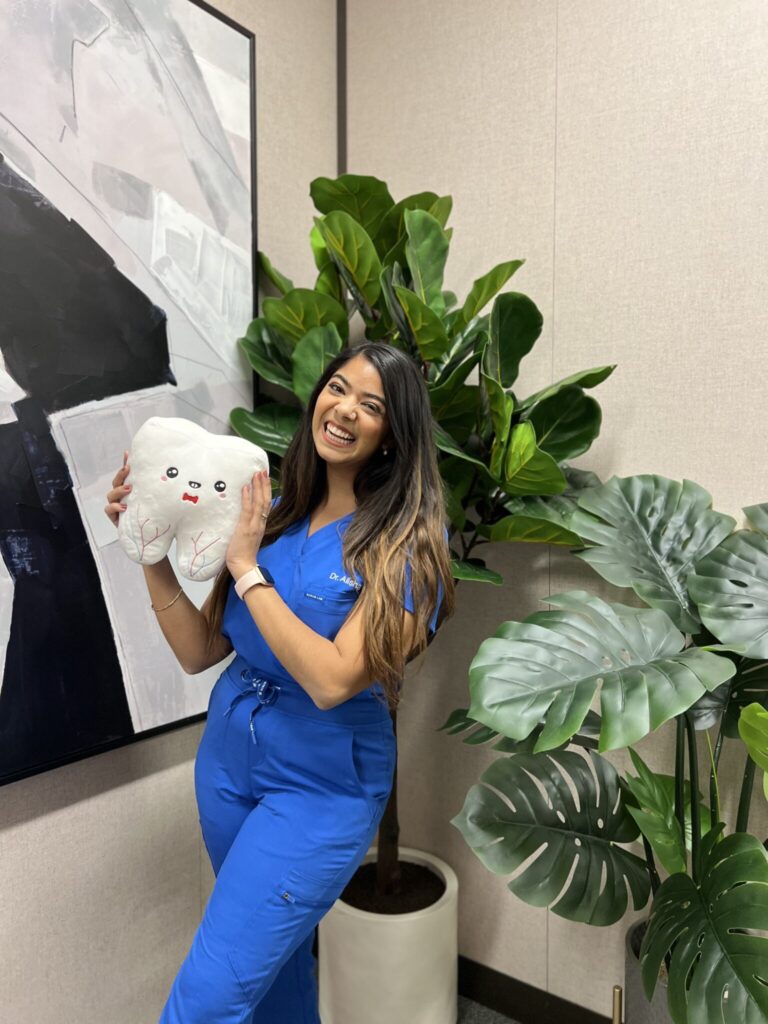
Next Gen of the Month is a monthly Q&A with a dental student or new dentist where we ask them about their experiences and accomplishments thus far in their dentistry journey. This month we are featuring Dr. Alisha Virmani, a new dentist and lifestyle blogger with a passion for encouraging diversity in healthcare.
Why did you decide to pursue dentistry?
My decision to pursue dentistry stemmed from a very negative experience of being bullied for my appearance and the subsequent desire to support others who may be equally struggling with their confidence. As a young child who underwent orthodontic treatment, I was able to experience both the physical and mental transformative impact of being surrounded by empathetic dental professionals. My goal was to become a dental professional that could help others smile again, regain their confidence, and feel welcome in a non-judgmental, safe clinical space.
Additionally, the societal and cultural doubts of others continued to spark my desire to become a dentist. As a South Asian woman, I was often faced with criticism from the older generation about how I should be focused on “marrying a doctor” rather than spending my twenties training to become one myself. I was often discouraged about how “women don’t belong in the sciences” and I was determined to change that narrative by becoming the first female doctor in my entire lineage.
Memorable moment from dental school?
A memorable moment from dental school was transforming the smile of a domestic violence victim and connecting her to adequate professional support and resources. This patient came into our school’s public dental clinic with signs of facial swelling, bruising, and trauma to her anterior teeth. My patient was initially very nervous to open her mouth or to discuss the history behind her bruising or dental trauma. I tried my best to focus on improving her dental health while creating a safe, welcoming space for her to open up to when she was ready. This experience from dental school taught me the importance of checking in on all your patients and developing a strong, trusting relationship with them regardless of how busy your clinical day may be. Although it was extremely heartbreaking to see my patient in an initial situation of domestic violence, seeing her smile again at the end of her dental treatment and knowing that I was able to connect her to the proper support remains a powerful memory.

Advice for future dental graduates?
If the procedure seems daunting to undertake in dental school, you should be more inclined to attempt it rather than shy away from it. During dental school, I found it easy to get stuck in the pattern of selecting cases that I was more comfortable with to protect my clinical grades or due to the fear of failure. When you are in dental school, you have the luxury of an expert to mentor you and guide you through challenging procedures. When you graduate from dental school, your clinical skills will matter more than what grade you achieved on that specific patient case. Continuing education upon graduation can be expensive and time consuming, so soak up all the opportunities in dental school by joining your school’s dental study club, attending your favourite dental professor’s office hours, and by taking on those challenging cases during your clinical placements!
Favourite way to relax?
My favourite way to relax is by spending time outdoors with my golden retriever, Mango! After studying and working in Australia for seven years, I really crave any opportunity to be by the waterfront for a stroll or a swim in the warmer months. I’m also a big fan of trying out different crafts; currently I’m loving pottery and painting. I recently moved to Toronto and love trying out all the yummy restaurants here!

Favourite and least favourite procedure to perform since practising?
Favourite procedure: Restorative. As someone who loves predictability and improving function – I love our bread and butter work. There is something so satisfying about creating a smooth cavity preparation and sculpting each cusp like you are working on a piece of art. I also love restorative work because I get to alleviate pain for my patients, help them be proud of their smile, and enable them to enjoy their favourite foods again.
Least favourite procedure: Endodontics. I can appreciate the importance of improving the longevity of a tooth and alleviating infection/pain for my patients, but I personally don’t enjoy the length of time required to complete a case or the multiple pieces of equipment/set up required. Shout out to the lovely endodontists that take on referred cases from us general dentists!
Can you tell us about your experience studying abroad in Australia and Australia’s dentistry reciprocal licensing agreement?
As someone who grew up in a small town, studying abroad was the best decision to push me outside of my comfort zone. I loved the ability to balance my rigorous dental studies with exploring a new continent, culture and landscape. In particular, the university I went to (James Cook University in Cairns, Queensland, Australia) had a focus on Indigenous, tropical, and rural dental medicine. I thoroughly enjoyed having multiple dedicated subjects regarding culturally competent care and using these skills on my final year clinical placement across multiple hospitals and clinics in various small towns in Queensland, Australia. I also found it extremely eye opening to see the overlap between the unique Indigenous dental health issues faced overseas to those faced here in Canada. Beyond dentistry itself, my favorite thing about studying abroad was having my university within a 5-minute drive to the beach and regularly snorkeling the Great Barrier Reef as a study break.
The best part about studying dentistry in Australia as a Canadian is the reciprocal agreement that was established in 2010. This meant that my Australian dental education was accredited in Canada and equivalent to graduates of Canadian dental schools. Similar to Canadian dental school graduates, Australian graduates must simply successfully complete the NDEB Virtual OSCE to begin practice in Canada.

What is your perspective on diverse representation in dentistry? Why it is important/necessary?
As someone who grew up in a small town in eastern Canada (New Brunswick), I never had the ability to connect with another female, South Asian dentist. Growing up, there were no South Asian dentists (male or female) in the larger neighbouring city to my hometown nor was there even a single dentist to serve the people in my rural community. Lacking representation in the field of dentistry made overcoming cultural and traditional societal barriers difficult. It also made envisioning my future as a female Indian dentist extremely challenging.
In my opinion, diversity in dentistry is required for culturally competent and empathetic care. It is important for patients to be able to communicate their healthcare needs in their language of choice and to feel understood by their dental practitioner. Diversity in dentistry allows patients to feel more comfortable in the clinic by having a provider who may better appreciate their food habits, beliefs and customs that may affect their dental health. It is also necessary to have representation in dentistry to help other dental practitioners understand how South Asian patients may incorporate traditional ayurvedic medicine in their dental routine. For example, it is commonplace in many Indian households to use natural toothpastes or dental remedies that may not be taught in the North American dental curriculum. These ayurvedic remedies can include the usage of neem, clove oil, tomar seed oil, ginger, acacia arabica (babul), pippali (piperine), turmeric and miswak. It is paramount that dentists are educated on these ayurvedic remedies to better promote evidence-based dental treatment that equally respects the merit behind certain holistic, natural practices in South Asia.
Dr. Alisha Virmani loves promoting diversity in healthcare, women in dentistry and advocating for internationally trained dentists. You can learn more about her on Instagram: @dentistrywithali

